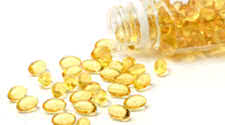Vitamin E improves Lean Muscle Growth - Bodybuilding Antioxidant

Advanced Health & Advanced Supplementation Science
Vitamin E is the jack-of-all-trades in the vitamin world. You may know about its antioxidant properties and heart-disease lighting power, but new evidence about this vitamin is particularly interesting to bodybuilders. Research indicates that Vitamin E plays an important role
in maintaining those precious slabs of meat hanging on your bones otherwise known as your muscles.
Once again scientists mined to rodent volunteers' for test subjects. The study rats whose limbs were immobilized seemed to lose less muscle mass when fed Vitamin E. That would be akin to you putting a cast on an arm or leg and raking some extra E to prevent excess loss of muscle.
Sure, you'll lose some muscle; but why not put the brakes on even greater potential muscle loss? So what happens if you aren't immobilized and you are training, can Vitamin E affect how your muscles respond? As it turns out, yes. In a study performed at Penn State University in
University Park, 12 weight- trained men were divided into two groups: One group received 1,200 lUs of Vitamin E once per day for two weeks while the control group received a Cellulose-based placebo pill.
These human guinea pigs then performed some typical resistance exercises such as the bench press, military press, calf raise, leg press, row, biceps curl and squat. Creatine kinase (CK), a marker of muscle-fiber injury, is known to increase after a bout of unaccustomed or intense
exercise(s). In this study, plasma CK levels increased significantly in both groups after 24 and 48 hours; however, the increase was less in the Vitamin E group than the placebo group at 24 hours. In essence, this means that the degree of injures caused by lifting heavy weights
was much less in the Vitamin F group than the placebo group.
But to get larger muscles, wouldn't you want more damage? An interesting experiment might have subjects train and take either a placebo or Vitamin E for six months to see if incurring greater muscle injury is better (or worse) with regard to muscle hypertropic. Plasma
rnalondialdehyde (MDA), an indicator of free-radical interaction with cellular membranes, was elevated in both groups, yet MDA levels remained higher for a longer period in the placebo group. Thus, Vitamin E once again proved its powerful antioxidant properties. So the bottom line
is, take that Vitamin E pill and take it with gusto!
That oil-filled gel capsule seems to decrease the amount of muscle injury that you incur after exercise and its antioxidant properties help squelch free radicals. How much should you take? Right now: scientists don't know the optimal dose for bodybuilders, but doses as high as
200-400 IU per day seem to protect cardiac muscle from the ravages of heart disease. Perhaps even higher doses (1,200 lUs in this study) may he warranted for protecting our visible muscles?